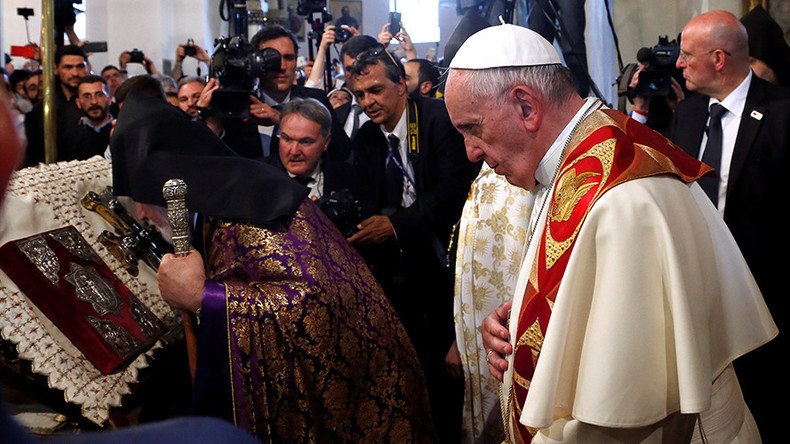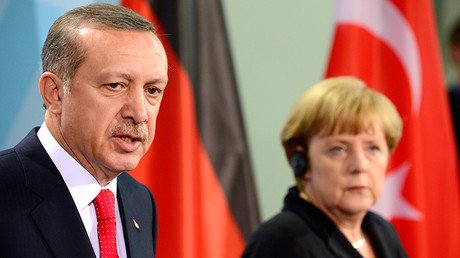Pope Francis describes mass killing of Armenians under Ottoman rule as 'genocide'

Pope Francis has described the mass killing of Armenians under Ottoman Turkish rule in World War I as “genocide” during a visit to Yerevan. It comes despite reports that he would instead use the word "martyrdom" when referring to the deaths.
The Friday remark is the second time the Pope has referred to the killings as genocide, a term that implies legal and financial implications, which allow the Armenians to demand restitutions.
It follows a similar statement in 2015 which was met with anger from Turkey.
Friday marks the start of the Pope's three-day visit to the Armenian capital. The pontiff is visiting the small nation in the heart of the Caucasus mountains, which was famous for becoming the first state to accept Christianity as its official religion.
The Pope addressed the audience in Armenia – a mostly Orthodox Christian nation with a population of 3 million in a largely Muslim region – with a wider political message on the atrocities committed towards the Christians of the Middle East by the extremists of Islamic State (IS, formerly ISIS/ISIL).
The visit is Pope Francis’s first to Armenia, and the only other pontiff ever to visit the country was Pope John Paul II, in 2001, when he took part in the 1,700th anniversary of Christianity being proclaimed Armenia’s state religion.
Addressing the Armenian people, Pope Francis called his visit an “apostolic journey.” The logo of the visit depicts Mount Ararat – the sacred Biblical mountain – and the ancient Armenian monastery Khor Virap, chosen for its exceptional role in spreading Christianity in the past.
Upon arrival, Pope Francis was met by President Serzh Sargsyan and his Holiness Catholicos of All Armenians Karekin II, and also bishops of the Armenian Apostolic Church and Catholic Church, diplomats and officials.
After a brief conversation with president, the Pope and the Catholicos left for the seat of the Armenian Apostolic Church in Etchmiadzin, where Francis is staying during his visit as a guest of the Oriental Orthodox patriarch of the Apostolic Church. The visit is planned to last till Sunday.
Pope Francis will be praying at Armenia's genocide memorial, and will release a dove of peace next to the closed Armenia-Turkey border. The Pope has already held an ecumenical prayer service with Karekin II, with the service conducted in Latin, but with Orthodox Armenian singing accompanying it.
Armenia is primarily an Orthodox Christian nation, although Catholics are also represented by a minority living in one region which the Pope plans to visit.
Journalists from over 80 countries are accompanying Pope Francis on his visit to Armenia, which is commemorating the centennial of the massacre of Armenians by the Ottoman Empire.
In April 2015, Francis held a speech at St. Peter’s Basilica in Rome addressing Armenian Christians who had gathered there, including Armenia’s President Sargsyan, during which he lamented the victimization of Christians around the world and acknowledged that atrocities of the past should be recognized.
Citing a joint declaration signed in 2001 by Armenia’s Catholicos and St. John Paul II, the Pope said that what had happened to the Armenians in Turkey’s Ottoman Empire a century ago ought to be considered “the first genocide of the 20th century.”
The document enraged the Turkish government to such an extent that Ankara’s ambassador to the Vatican, Mehmet Pacaci, was recalled and returned to the Vatican only 10 months later.
The Pope had recently stated that he would not use the word genocide during his trip to the Caucasus, replacing it with the word martyrdom when describing the persecution of Christians.
Turkey has always denied the genocide allegations, claiming the statistics of the dead were forged and inflated, combining the number of all the deaths that occurred while the Ottoman Empire was collapsing amidst World War I.













